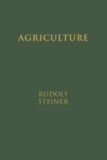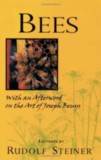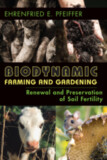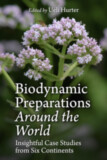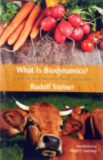Agriculture
Spiritual-Scientific Foundations for Agricultural Renewal (CW 327)
- Publisher
Rudolf Steiner Press - ISBN 9781855846661
- Language English
- Pages 494 pp.
- Size 6" x 9.25"
8 lectures and 4 Q&A sessions, Kobierzyce, Poland, June 7–20, 1924 (CW 327)
A century after Rudolf Steiner's lectures on agriculture in 1924, the effects of his words are self-evident—around the world, biodynamic principles are practiced on thousands of thriving farms, vineyards, and gardens, and Demeter certification for biodynamic produce is recognized internationally as a mark of health and quality.
Speaking to a small audience of farmers in the small village of Kobierzyce, Poland, Steiner launched the first organic agricultural movement. Nevertheless, what has come to be known today as “biodynamics” is distinguished by a number of unique aspects, including the use of herbal and mineral preparations (“dynamizing” applications for compost and field sprays) and the concept of farms and gardens as a individual living organisms that incorporate animals, crops, soil, and community.
This definitive centenary edition of Steiner’s influential agriculture course has been reedited from primary sources to be as faithful as possible to his original meaning and intention. Shorthand reports have been newly transcribed, archival discoveries added, and fresh commentary and notes inserted.
In addition to the original eight lectures and four discussions, this volume features a wealth of new texts, including notes, addresses, and resolutions related to the Experimental Circle (contemporaneously established to join research with practice), comprehensive facsimiles of Steiner’s preparatory notes for the course; original programs and lists of attendee; questions sent in advance; Steiner’swritten and verbal reports, including his address to young people; photos of Kobierzyce; and high-quality color plates of his original blackboard drawings.
This book is a translation from German of Geisteswissenschaftliche Grundlagen zum Gedeihen der Landwirtschaft. Landwirtschaftlicher Kursus (GA 327).
C O N T E N T S:
Introduction by Ueli Hurter
Part I: The Agriculture Course (8 lectures and 4 Q&A sessions)
Part II: The Founding of the Agricultural Experimental Circle
Appendix:
Subsequent Verbal Report by Rudolf Steiner
Extracts from Rudolf Steiner’s Written Reports
Extracts from Rudolf Steiner’s Address to Young People
Program for the Whitsun Conference in Breslau and the Course at Koberwitz
Photos of Koberwitz
Questions Sent in Advance
List of Participants in the Agriculture Course
Regarding this edition
Rudolf Steiner’s Collected Works
Significant Events in the Life of Rudolf Steiner
Index
Rudolf Steiner’s Blackboard Drawings (plate section)
Rudolf Steiner
Rudolf Steiner (b. Rudolf Joseph Lorenz Steiner, 1861–1925) was born in the small village of Kraljevec, Austro-Hungarian Empire (now in Croatia), where he grew up. As a young man, he lived in Weimar and Berlin, where he became a well-published scientific, literary, and philosophical scholar, known especially for his work with Goethe’s scientific writings. Steiner termed his spiritual philosophy anthroposophy, meaning “wisdom of the human being.” As an exceptionally developed seer, he based his work on direct knowledge and perception of spiritual dimensions. He initiated a modern, universal “spiritual science” that is accessible to anyone willing to exercise clear and unbiased thinking. From his spiritual investigations, Steiner provided suggestions for the renewal of numerous activities, including education (general and for special needs), agriculture, medicine, economics, architecture, science, philosophy, Christianity, and the arts. There are currently thousands of schools, clinics, farms, and initiatives in other fields that involve practical work based on the principles Steiner developed. His many published works feature his research into the spiritual nature of human beings, the evolution of the world and humanity, and methods for personal development. He wrote some thirty books and delivered more than six thousand lectures throughout much of Europe. In 1924, Steiner founded the General Anthroposophical Society, which today has branches around the world.



